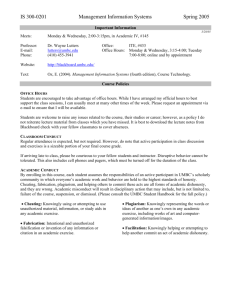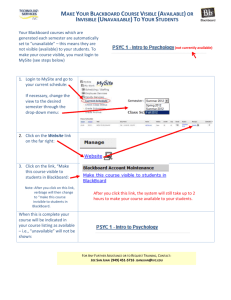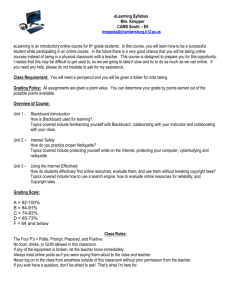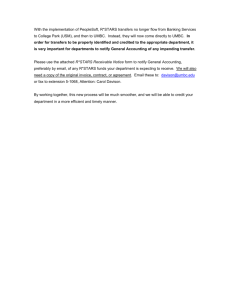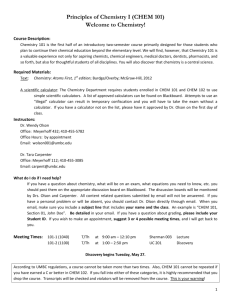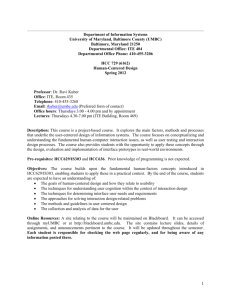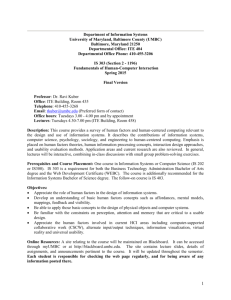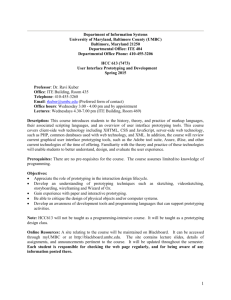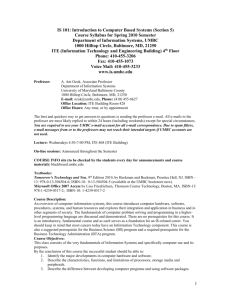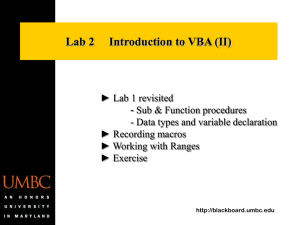IS 601 Foundations of Information Systems Spring 2005
advertisement
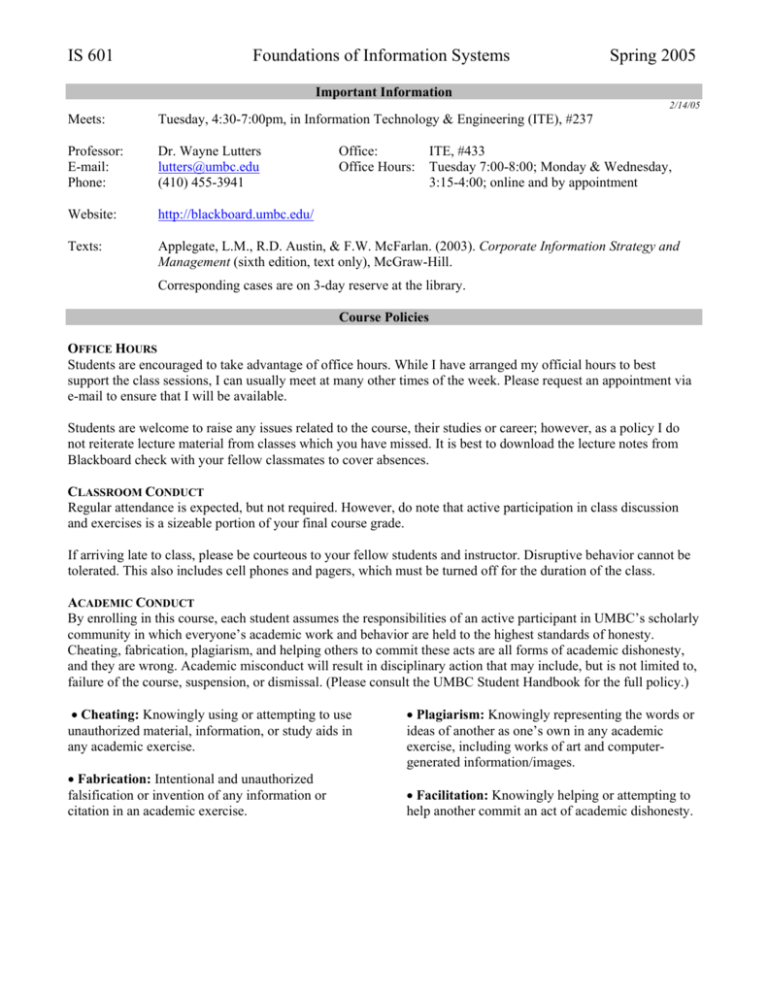
IS 601 Foundations of Information Systems Spring 2005 Important Information 2/14/05 Meets: Tuesday, 4:30-7:00pm, in Information Technology & Engineering (ITE), #237 Professor: E-mail: Phone: Dr. Wayne Lutters lutters@umbc.edu (410) 455-3941 Website: http://blackboard.umbc.edu/ Texts: Applegate, L.M., R.D. Austin, & F.W. McFarlan. (2003). Corporate Information Strategy and Management (sixth edition, text only), McGraw-Hill. Office: Office Hours: ITE, #433 Tuesday 7:00-8:00; Monday & Wednesday, 3:15-4:00; online and by appointment Corresponding cases are on 3-day reserve at the library. Course Policies OFFICE HOURS Students are encouraged to take advantage of office hours. While I have arranged my official hours to best support the class sessions, I can usually meet at many other times of the week. Please request an appointment via e-mail to ensure that I will be available. Students are welcome to raise any issues related to the course, their studies or career; however, as a policy I do not reiterate lecture material from classes which you have missed. It is best to download the lecture notes from Blackboard check with your fellow classmates to cover absences. CLASSROOM CONDUCT Regular attendance is expected, but not required. However, do note that active participation in class discussion and exercises is a sizeable portion of your final course grade. If arriving late to class, please be courteous to your fellow students and instructor. Disruptive behavior cannot be tolerated. This also includes cell phones and pagers, which must be turned off for the duration of the class. ACADEMIC CONDUCT By enrolling in this course, each student assumes the responsibilities of an active participant in UMBC’s scholarly community in which everyone’s academic work and behavior are held to the highest standards of honesty. Cheating, fabrication, plagiarism, and helping others to commit these acts are all forms of academic dishonesty, and they are wrong. Academic misconduct will result in disciplinary action that may include, but is not limited to, failure of the course, suspension, or dismissal. (Please consult the UMBC Student Handbook for the full policy.) • Cheating: Knowingly using or attempting to use unauthorized material, information, or study aids in any academic exercise. • Fabrication: Intentional and unauthorized falsification or invention of any information or citation in an academic exercise. • Plagiarism: Knowingly representing the words or ideas of another as one’s own in any academic exercise, including works of art and computergenerated information/images. • Facilitation: Knowingly helping or attempting to help another commit an act of academic dishonesty. Grading Policies GRADING STANDARDS UMBC’s Graduate Catalog states that, “A, indicates superior achievement; B, good performance; C, adequate performance; D, minimal performance; F, failure.” There is specifically no mention of numerical boundaries that determine these final letter grades. These can only be defined at the end of the semester after all scores have been earned (usually using a “curve”). This means that it is not appropriate to assume that a given numerical score corresponds to a particular letter grade. It is also important to understand that final letter grades reflect actual academic achievement and not effort. All assignment grades will be posted on Blackboard and key grade distributions will be provided throughout the course to assist students in measuring their performance. GRADING DETAILS Student performance in IS 601 is primarily evaluated independently although there is one significant group deliverable. All scores will be reported as out of 100 points, but weighted as follows to generate the final grade. Assignment Type Percentage Individual 30% Group (2) 20% Exam Case Management • Presentation (10%) • Précis (5%) • Blackboard (5%) Social Impacts Debate Individual 15% • Presentation (10%) • Statement/Summary (5%) Emerging Technology Group (3) 25% • Milestones (5%) • Presentation (10%) • Report (10%) Participation Individual 10% 100% LATE WORK Assignments are due at the beginning of class or as indicated. Late assignments will not be accepted. OIT instructions for registering for the IS 601 Blackboard 6 course website: 1.) Go to http://blackboard.umbc.edu 2.) When you press the "login" button, you will receive a UMBC "WebAuth" login prompt. Simply use your usual UMBC "kerberos" userid & password. You will then be redirected to your course or to the MyBlackoard screen that lists your available courses. 3.) If you have not enrolled in the online course before, click on the "course" button. Then click on "Browse Course Catalog". 4.) Type in a keyword for your course in the text box. For example, if you are taking an English course, type in ENGL. Click on "Go". 5.) Find your course site and click on the "Enroll" button on the far right side of the window. Click on "Submit", and "OK", when prompted to do so. Assignments BLACKBOARD This course will rely heavily on its Blackboard (Bb) website for case presentations, ongoing class discussions, posting announcements, archiving lecture notes, distributing assignments, online gradebook, etc. All students must verify enrollment after the first class (instructions on previous page) and check-in regularly. It is assumed that students will visit at least twice a week. During the course of the semester we will get to know each other well. To start this process, and assist in group formation, please set up a personal web page within Bb introducing yourself. If you already have a personal page, at UMBC or elsewhere, you may simply provide a link in Bb. EXAMS There will be one comprehensive, take-home final exam due 5/23. CASE MANAGEMENT MIS is traditionally taught in business schools via case studies. These provide interpretive context; grounding abstract concepts in real world examples. Case synopses will inform our weekly discussions. To that end pairs of students will “own” one of the textbook cases for the semester. This requires that they: 1.) 2.) 3.) 4.) Read and understand the case, using outside resources if helpful. Post on Bb a brief 1-2 paragraph précis, distilling the main attributes, and class discussion questions. Introduce the case in class on the day requested, present & lead discussion. Actively integrate your case in class discussion and maintain its Bb discussion thread throughout the semester. SOCIAL IMPACTS DEBATES Almost every week we will end class with a structured 30-minute debate regarding a contemporary social impacts/ethics issue. Three students will lead the class in each session via the following pre-assigned roles: • • • Moderator: Introduce the topic with a contemporary news story, moderate the debate, direct class Q&A, record the final class vote, write a summary of the session, post the summary in Bb forum. Proponent: Write a brief position statement, post it in the Bb forum, defend your position in class/online. Opponent: Write a brief position statement, post it in the Bb forum, defend your position in class/online. EMERGING TECHNOLOGIES IT changes dramatically and rapidly. One of the greatest challenges is to successfully “manage the future.” This exercise will integrate the skills learned in the class to research an emerging technology, estimate its trajectory, and understand its potential business implications. This will be accomplished in teams of 3 students, involving: • • • Milestones: Formal checkpoints throughout the semester (team formation, technology selection, reference identification, outline preparation) Presentation: A professional 15-minute presentation to a team of “CIO’s and venture capitalists.” Report: A 10-15 page final position paper that builds a clear argument using well referenced evidence. PARTICIPATION Participation is not “class attendance.” The score reflects the sustained level of active participation in class activities and thoughtful contributions to course discussion, both in-class and online. Thus, it will start at zero and fluctuate throughout the semester. Department of Information Systems University of Maryland, Baltimore County Baltimore, MD 21250 3 Tentative Schedule Following is a tentative schedule of lecture topics, readings, assignment due dates, and the exam. The instructor reserves the right to adjust this schedule for any reason, given fair advanced notice both in class and on the Blackboard announcements page. In addition, the most current schedule will always be available under “Course Information.” Please check Blackboard frequently to ensure that your information is up-to-date. Date 2/1 Class Topic Course introduction, MIS overview 2/8 2/22 Organizational structures Presentation skills P1 Basic business functions I (J. Campbell) Creating business advantage BBF II (J. Campell) A1 Library research skills (E. Rector) Networked business I A3 3/1 Business models A2 3/8 Networked business II A4 3/15 Infrastructure A5 3/22 Spring Break 3/29 Reliability & security A6 4/5: Process & quality control P2 4/12 Leading, organizing, managing A8 601 4/19 Outsourcing A9 617 4/26 655 5/3 Managing diverse infrastructures A7 Global issues (A. Komlodi) Knowledge management P3 5/10 Portfolio management 2/15 Read A10 Case SID Assignment Home page ET: Team 79 & 103 130 & 165 342 & 374 ET: Technology Privacy I (customer) 500 & 507 ET: References Privacy II (employee) Internet regulation National IT development IT: Does it matter? ET: Outline Report & present Emerging technologies I 5/17 Course wrap-up Report & present Emerging technologies II 5/23 Take Home Exam Due Note: Case numbers refer to the corresponding textbook pages supporting that activity. Department of Information Systems University of Maryland, Baltimore County Baltimore, MD 21250 4
